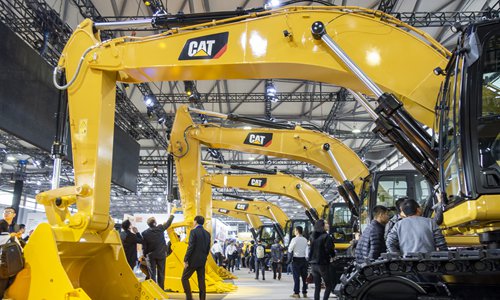More companies see China as top investment destination
Amid the China-US trade war, most American companies saw their profitability decline in China in 2018. But the nation remained a high-priority market for the majority of US companies, a survey showed on Tuesday.

Visitors look at excavators made by US machinery maker Caterpillar Inc at an industry exhibition in Shanghai in November 2018. (Photo: VCG)
China ranked as a first or top-three priority in 62 percent of members' near-term global investment plans, according to a survey released by the American Chamber of Commerce in China (AmCham China). The percentage was higher than 2017, when it was 59 percent, or 2016, when it stood at 56 percent.
The consumer sector especially values the Chinese market, with nearly 80 percent of the respondents ranking China as a top-three investment destination.
The survey was conducted in November and December 2018 and represented the views of 314 out of 771 AmCham China member company representatives.
The report offered some insights on the performance of US-based companies operating in China, as 12 percent of the respondents estimated their revenue growth decreased in 2018, compared with 7 percent in 2017.
Overall profitability declined, too, in 2018 - 10 percent of the respondents reported a loss, compared with 7 percent in 2017.
Trade war impact
The report said worsening industry conditions and increased costs were the main factors bringing down profits. Technology and resources companies and those in the industrial sector reported that they are facing stronger competition from private-sector Chinese companies.
The trade war, which was started by the US and led to tariffs on hundreds of billions of dollars worth of Chinese exports, also hurt some of the US companies in China, as the Chinese government retaliated with its own tariffs.
The surveyed companies were classified into four broad groups: technology and other research and development-intensive industries; resource and industrial companies; the consumer sector and the services sector.
Surveyed companies said the impact of tariffs included increased manufacturing costs, higher sales prices and lower demand. Declines in profits and losing business to competitors were also listed as major issues. The technology and resource and industrial sectors felt hardest hit by tariffs, the report said.
Zhang Monan, a research fellow at the China Center for International Economic Exchanges, told the Global Times that the report is like an early warning to US companies, that are behind the US government in pushing for more structural changes in China.
"Now their actions are having a reaction, and their concrete interests are being harmed," Zhang said.
"Multinational companies, at the end of the day, will value their global interests the most," noted Zhang.
Tian Guangqiang, assistant research fellow with the National Institute of International Strategy at the Chinese Academy of Social Sciences, said it is natural that US firms felt more competition from their Chinese counterparts as China climbs the technological ladder.
"Given that many Chinese companies are catching up in technology, and they know China's unique culture, and have offerings with more competitive pricing, it is natural that US firms felt the rising pressure of competition," Tian said.
As the Chinese economy upgrades, a great number of foreign companies from outside of the US will set up shop in China. This will also erode some of the market share currently enjoyed by US companies, noted Tian.
Improved assessment
The report found more US companies in China see improvements in the quality of China's investment environment, with 38 percent of them reporting an improving situation, up from 35 percent in 2017 and 24 percent in 2016. Technology and other research and development-intensive industries were the most positive.
Nearly half of the respondents believed Chinese government's policies are enforced equally for foreign and local companies and about the same percentage of those surveyed said they would consider increasing investment in China if its markets were as open as those in the US.
But the attractiveness of the Chinese market will only be stronger, analysts said.
"On the one hand, we have tepid growth in Western countries. On the other, we have the resilient, vast Chinese economy that is one of the world's fastest-growing markets. Incomes are also rising in China, along with demand for better quality, especially high-tech products," Tian said.
China is the world's most appealing market for high-tech products, Zhang pointed out.


